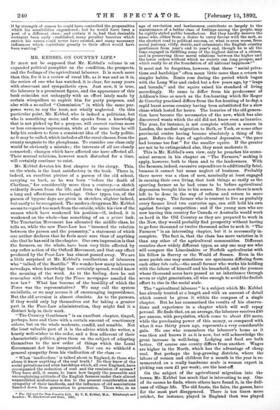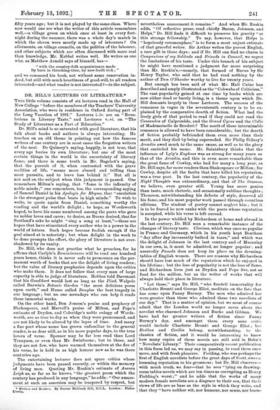MR. KEBBEL ON COUNTRY LIFE.*
IT must not be supposed that Mr. Kebbel's volume is an expanded political pamphlet on the condition, the prospects, and the feelings of the agricultural labourer. It is much more than this, for it is a review of rural life, as it was and as it is,
the review of one who has watched, it is clear, for many years with observant and sympathetic eyes. Just now, it is true, the labourer is a prominent figure, and the appearance of this book coincides not unhappily with an effort lately made by certain wirepullers to exploit him for party purposes, and also with a so-called " Commission " in which the same pur- poses were, to say the least, not wholly neglected. On this particular point, Mr. Kebbel, who is indeed a politician, but who is something more, and who speaks from a knowledge that is not picked up for a purpose, will correct various more or less erroneous impressions, while at the same time he will help his readers to form a consistent idea of the body politic, as it may be called, which includes all the rural classes, from the county magnate to the ploughman. To consider one class only would be obviously a mistake ; the interests of all are closely connected ; changes which have affected one have affected all. Their mutual relations, however much disturbed for a time, will certainly continue to exist.
Mr. Kebbel devotes his first chapter to the clergy. This,
on the whole, is the least satisfactory in the book. There is, indeed, an excellent picture of a parson of the old school, carrying us back, as he was born " before the death of Chatham," for considerably more than a century,—a sketch evidently drawn from the life, and from the opportunities of a long and affectionate knowledge. Other types, too, of the parson of bygone days are given in sketches, slighter indeed, but easily to be recognised. The modern clergyman Mr. Kebbel seems to regard too much from the outside, while his view of the causes which have weakened his position—if, indeed, it is
weakened on the whole—has something of an a priori, look. The Tractarian Movement has alienated the middle class, he tells us, while the new Poor-Law has " loosened the relation between the parson and the peasantry," a statement of which our author declares that he feels more sure than of anything
else that he has said in the chapter. Our own impression is that the farmers, on the whole, have been very little affected by any reflex action of the Oxford Movement, and that any effect produced by the Poor-Law has almost passed away. We are a little surprised at Mr. Kebbel's recollections of labourers who " talked of the Bastille." We wonder how many labourers
nowadays, when knowledge has certainly spread, would know the meaning of the word. As to the feeling, does he not remember with what fury the Times newspaper assailed the new law P What has become of the hostility of which the Times was the representative P We may call the system socialistic, or we may accuse it of encouraging improvidence. But the old aversion is almost obsolete. As to the parsons,
if they would only lay themselves out for taking a greater part in the Poor-Law administration, they might find it a distinct help in their work.
" The Country Gentlemen" is an excellent chapter, tinged, perhaps, here and there with a certain amount of reactionary colour, but on the whole moderate, candid, and sensible. Not the least valuable part of it is the advice which the writer, a hearty well-wisher to the order, and a firm adherent of their characteristic politics, gives them on the subject of adapting themselves to the new order of things which the Local Government Act has inaugurated. Nor can we withhold a general sympathy from his vindication of the class
" When `landlordism' is talked about in England, do those who abuse it know anything of the real truth P Do they know of the social privations and even hardships which, all over England, have accompanied the reduction of rent and the remission of arrears ? They have still, it seems, to learn how largely the peaceable and uncomplaining attitude of the English farmers under their almost unparalleled misfortunes is due to the present consideration and sympathy of their landlords, and the influence of old associations handed down from generation to generation. Those who, in an
• The Old and the Now Country Life. By T. B. %ebbe], M.A.. Bdinburgh and London: W. Blackwood and Bons. 1891.
age of revolution and lawlessness, contribute so largely to the maintenance of a better class of feelings among the people, may be rightly styled public benefactors. But they hardly deserve the name who, either from a desire to curry favour with the mob, as the shortest road to political success, or, what is even worse, from social jealousy, vilify, deride, and calumniate the English country gentleman from year's end to year's end, though he is all the time engaged in fulfilling some of the highest duties of a citizen, and in preserving those moral relations between the higher and the lower orders without which no society can long prosper, and which really lie at the foundation of all national happiness ?"
It must not be forgotten, however, that these " social priva-
tions and hardships" often mean little more than a return to simpler habits. Rents rose during the period which began with the Long War and ended but a few years ago, by "leaps and bounds," and the squire raised his standard of living accordingly. He came to differ from his predecessor of Addison's time as much as the fox-hunting which Sir Roger de Coverley practised differs from the fox-hunting of to-day, a rapid burst across country having been substituted for a slow chase which lasted for hours. The luxuries of the old genera- tion have become the necessaries of the new, which has also
discovered wants which the old did not know even as luxuries. The year, for instance, is not complete without a season in London, the modest migration to Bath, or York, or some other
provincial centre having become absolutely a thing of the past. Before the days of agricultural depression, "the pace had become too fast" for the smaller squire. If the greater are not to be extinguished also, they must moderate it.
This is Mr. Kebbel's own view, only he preaches his econo- mical sermon in his chapter on " The Farmers," making it apply, however, both to them and to the landowners. With the farmers, indeed, excessive expenditure is additionally fatal, because it cannot but mean neglect of business. Probably there never was a class of men, nominally at least engaged in earning their own living, that took things so easily as the sporting farmer as he had come to be before agricultural depression brought him to his senses. Even now there is much left to be done in the way of reform and return to more sensible ways. The farmer who is content to live as probably every farmer lived two centuries ago, can still hold his own against foreign competition ; and if the young men who are now leaving this country for Canada or Australia would work as hard in the Old Country as they are prepared to work in the New, they would probably find prosperity without having to go four thousand or twelve thousand miles to seek it. " The Farmers " is an interesting chapter, but it is necessarily in- complete. The fact is, that the class has more varieties in it than any other of the agricultural communities. Different counties show widely different types, as any one may see who will compare the Lincolnshire or Norfolk agriculturist with
his fellow in Surrey or the Weald of Sussex. Even in the same parish one may sometimes see specimens differing from each other tote ecelo,—the small farmer who works his holding
with the labour of himself and his household, and the yeoman whose thousand acres have passed as an inheritance through seven or eight generations, all wise enough to avoid the foolish effort to rise in the social scale.
The "agricultural labourer" is a subject which Mr. Kebbel has already treated at a length and with an amount of detail which cannot be given it within the compass of a single chapter. But he has summarised the results of his observa- tions and experience in a chapter which will well repay perusal. He finds that, on an average, the labourer receives £40 per annum, with perquisites, which come to about £10 more, while the purchasing power of this money, as compared with what it was thirty years ago, represents a very considerable gain. No one who remembers the labourer's home as it was then and knows it as it is now, but will acknowledge the great increase in well-being. Lodging and food are both better. Of course one county differs from another. Wages are higher in the North, which has the advantage of cheap coaL But perhaps the hop-growing districts, where the labour of women and children for a month in the year is re- munerated on a really handsome scale (a woman expert in picking can earn £1 per week), are the best-off.
On the subject of the agricultural migration into the towns, Mr. Kebbel has much that is interesting to say. One of its causes he finds, where others have found it, in the dull- ness of village life. The old feasts, the fairs, the games, have for the most part disappeared. There is ten times more cricket, for instance, played in England than was played fifty years ago ; but it is not played by the same class. Where now would one see what the writer of this article remembers well,—a village green on which once at least in every fort- night during the summer, there was a whole day's match in which the eleven were mostly made up of labourers ? On allotments, on village councils, on the politics of the labourer, and other subjects which are often discussed with more zeal than knowledge, Mr. Kebbel writes well. He writes as one who, as Matthew Arnold says of himself, has- " with the country-folk acquaintance made By barn in threshing-time, by new-built rick ; " and we commend his book, not without some reservation in- deed, but still with much heartiness of good-will, to all readers interested—and what reader is not interested ?—in the subject.



































 Previous page
Previous page